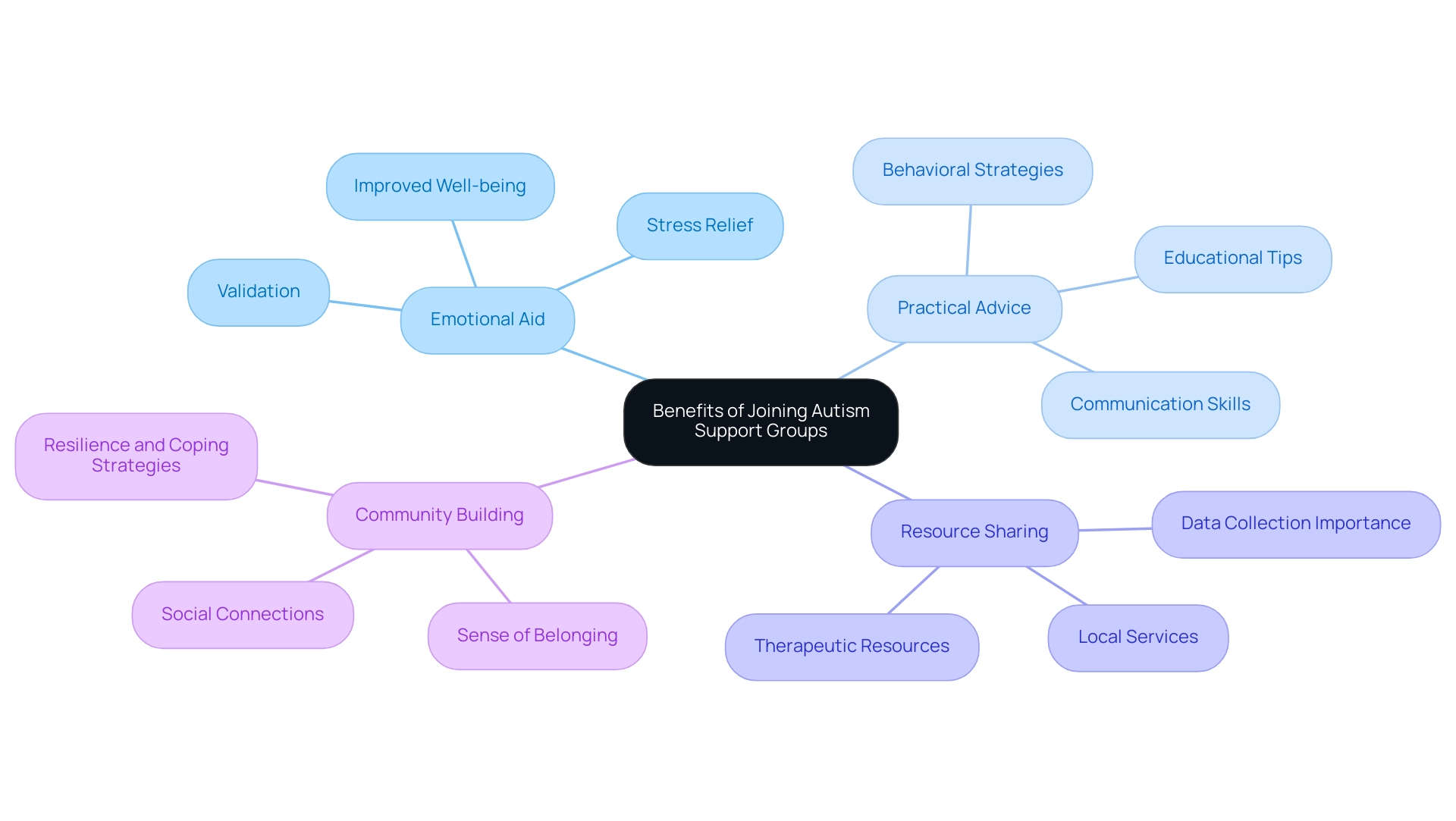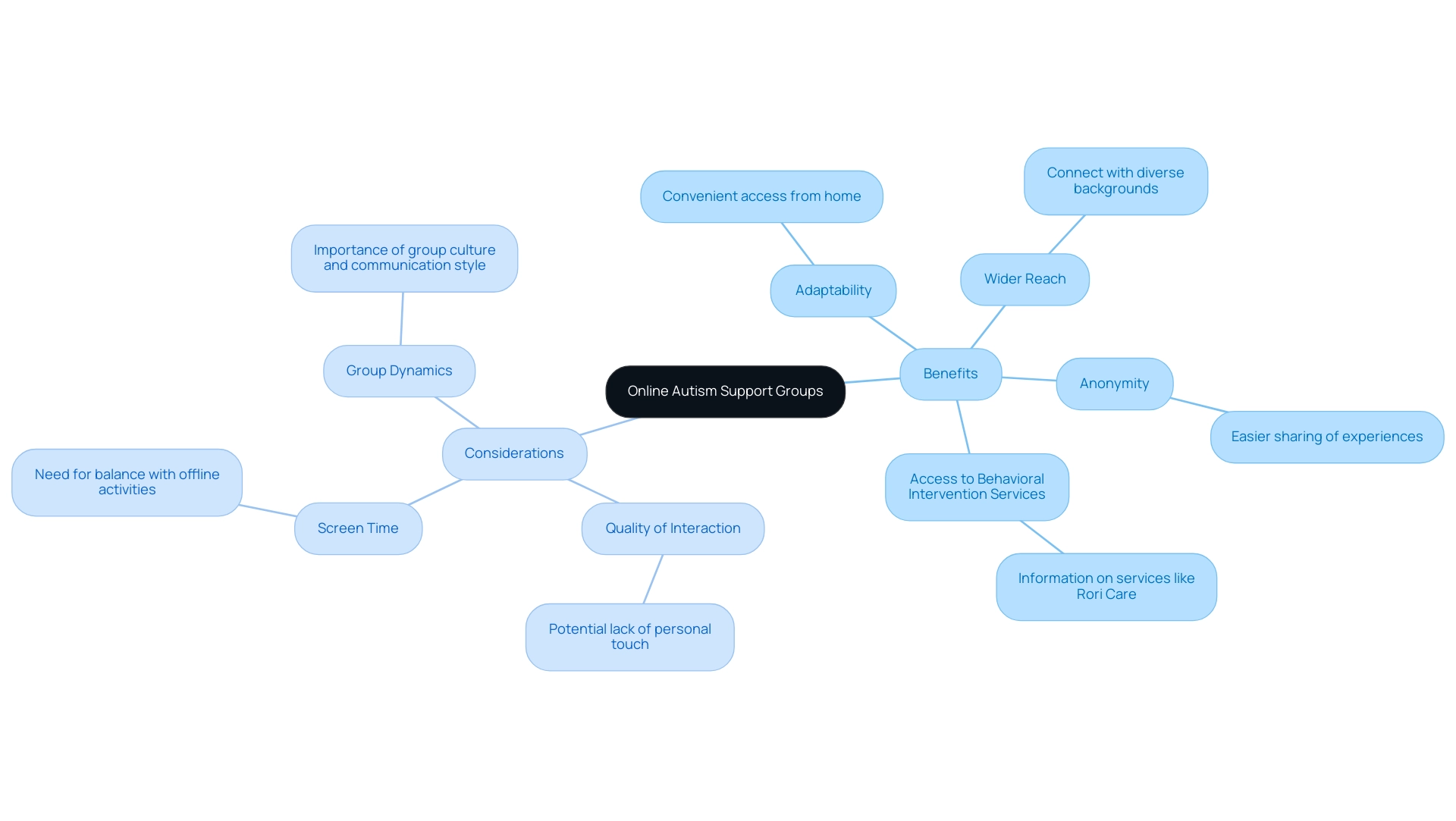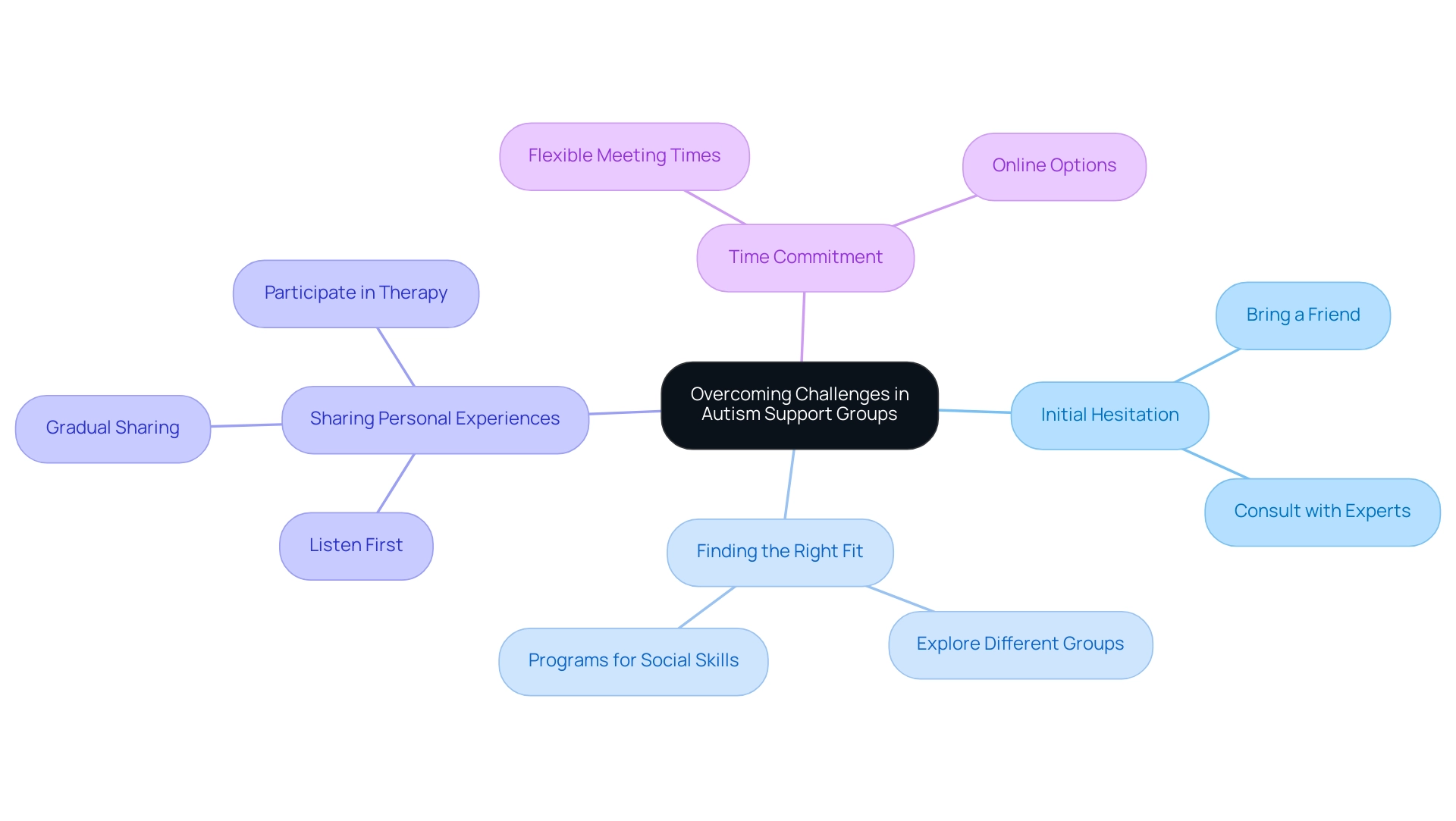Finding the right autism support groups for your family is so important! These networks not only provide emotional support but also offer practical advice and resources that can really enhance your coping strategies and overall well-being. Engaging in these groups helps create community connections and gives caregivers valuable insights. This can significantly improve the way families manage autism-related challenges, empowering them on their journey. Let’s explore this together!
In a world where the complexities of autism can often leave families feeling isolated and overwhelmed, support groups shine as a beacon of hope and connection. These vital resources not only create a sense of community but also offer a platform for sharing experiences, strategies, and emotional support. As more families join autism support groups, the benefits of being part of these networks become increasingly clear.
From empowering parents with practical advice to enhancing children’s developmental outcomes through targeted interventions, these groups play a crucial role in navigating the challenges of autism. With various formats available—whether in-person gatherings, online forums, or specialized groups—families can find the right fit to ensure they receive the support they need.
The journey toward understanding and advocating for a loved one with autism becomes significantly easier when families come together to share their stories and resources. Let’s explore this together! We’re here to help you every step of the way!
Autism support groups are vital resources for families, offering a nurturing space where individuals can connect with others who share similar challenges. These communities encourage the sharing of experiences, concerns, and practical strategies, which can be especially comforting for parents who often feel overwhelmed by the demands of raising a child with developmental differences. Engaging in these networks not only builds a sense of community but also provides families with valuable insights that can enhance their child's development and daily management, particularly through the behavioral intervention services provided by Rori Care – ABA Therapy.
In 2025, we've seen a significant rise in participation rates in these support networks, highlighting a growing recognition of their importance. More families are turning to autism support groups for guidance, with many sharing that they’ve developed better coping strategies and emotional resilience. Experts agree that these groups can lead to positive outcomes, such as improved communication skills and better behavioral management for children with autism, especially when caregivers are equipped with ABA principles and strategies.
Support networks come in various forms, including in-person meetings, online forums, and social media platforms, each offering unique benefits. In-person gatherings foster direct connections and community building, while online platforms provide flexibility and accessibility for busy families. Social media networks enable continuous support and resource sharing, making it easier for families to stay connected and informed about effective behavioral interventions.
Recent studies stress the importance of social workers being trained to help parents with future planning for their children, breaking the process into manageable steps. This aligns with findings from case studies that underscore the vital role families play in advocating for individuals with developmental disorders. For instance, the case study titled 'Family and Community Assistance for Autism' showcases how families provide crucial support and advocacy, reinforcing the value of joining these groups.
Access to autism support groups and assistance systems is essential for effectively navigating the challenges associated with developmental disorders, especially given the average cost of therapeutic behavioral services in the U.S., which is estimated at $175.44.
Additionally, CDC data indicates a male-to-female ratio of 4:1 in developmental disorders, with other research suggesting a ratio closer to 3:1. This prevalence highlights the significance of autism support groups for families facing developmental challenges, as these groups offer vital resources and connections to experts, empowering caregivers to make informed choices that positively influence their child's development.
In conclusion, support networks play a crucial role in enhancing the well-being of families. They provide a platform for connection, learning, and advocacy, ultimately enabling parents and caregivers to make informed decisions and nurture their child's growth through active involvement and information sharing, especially through the services offered by Rori Care – ABA Therapy, which addresses various behavioral challenges and supports individuals of all ages.
When exploring the terrain of assistance networks, families can choose from various distinct categories, each offering unique advantages.
In 2025, statistics reveal that about 5% of all students in the U.S. do not complete high school, highlighting the critical need for effective assistance systems. Additionally, non-Hispanic Black and Hispanic children have higher rates of the condition compared to non-Hispanic White children, with prevalence rates of 29.3% and 31.6% respectively. This underscores the importance of customized assistance networks for diverse communities.
Tova Leibowitz, a BCBA and Clinical Director at Rori Care – ABA Therapy, emphasizes the need to make ABA sessions enjoyable and interactive for autistic children. This can provide valuable insights for parents looking for effective strategies. Moreover, the effectiveness of ABA therapy is well-documented; it is recognized as the gold standard for treating individuals with developmental disorders, endorsed by various health organizations for its ability to teach essential skills to autistic children. Lastly, it’s important to note that adults can receive diagnoses later in life, which can validate their experiences and help them access suitable assistance.
By examining these different kinds of assistance networks, families can find autism support groups that best match their needs and preferences. Let’s explore this together, ensuring you receive the most relevant and meaningful support on your journey!
Participating in an autism assistance network can offer so many benefits for families navigating the challenges of autism.
Overall, joining autism support groups can offer both emotional and practical assistance that greatly enhances a family’s ability to navigate the complexities related to autism. As research continues to explore the factors affecting developmental disorder rates and care, the role of these support networks remains vital in empowering families and improving outcomes. Let’s explore this together!

Finding the right autism support group can truly enhance your family's experience, and there are several essential steps to consider:
By following these steps, families can effectively find and assess autism support groups that offer the necessary resources. With around 5% of all students in the U.S. not completing high school, the importance of these support networks cannot be overstated. They play a crucial role in empowering families and individuals, ensuring that everyone has the tools and connections needed for success.
As the US Surgeon General states, "the advantages of assistance networks are well-documented," highlighting the essential role these associations play in fostering resilience and success. Moreover, social workers need training to help parents prepare for their child's future in manageable steps, underscoring the importance of well-trained facilitators in groups. Essential neurodiverse community resources are available, providing families with the tools, networks, and guidance they need for success.
Understanding the varied requirements of families seeking assistance, as explored in the case study 'Demographic Insights: Who is Affected by Autism?', is key to developing targeted support programs. Rori Care also offers complimentary consultations with our Board Certified Behavior Analyst to assist families after a diagnosis, ensuring they have access to the guidance they need.
Let’s explore this together! We're here to help you every step of the way!
Online autism support groups are becoming a go-to resource for many families, providing a convenient and accessible way to connect. Let’s take a look at some important benefits and factors to consider:
Benefits:
Considerations:
Additionally, let’s not overlook the financial aspect of seeking help. The average cost of therapeutic behavioral services in the U.S. is $175.44, which might influence a family's decision to explore online support options. Plus, it’s interesting to note that boys are identified with this condition 4.2 times more often than girls, which can provide context for families navigating these challenges.
Effective support for families includes access to community resources, information, and connections with others facing similar situations—especially through autism support groups. Continuous advancements in research on developmental disorders highlight the importance of staying updated on new findings and treatment options. Online support networks can be a fantastic resource for families to engage with the latest developments in the field, including information about HIPAA compliance and data management policies that ensure privacy and security in the use of technology for behavioral interventions.
By thoughtfully weighing these benefits and factors, families can navigate the world of online support networks for individuals with developmental challenges, discovering the right fit to enrich their journey. Let’s explore this together!

The feeling of belonging that autism support groups cultivate for families navigating the challenges of raising a child with developmental disorders is truly invaluable. Building connections within these groups can bring about so many wonderful benefits:
Studies suggest that getting involved in autism support groups can significantly improve family experiences, with many households noting enhanced emotional well-being and access to resources. By actively participating in these groups and equipping themselves with ABA strategies and knowledge, families can create a supportive environment that not only enriches their journey but also fosters lasting connections that can be invaluable in navigating the challenges of developmental differences. This understanding is crucial for developing effective support programs and health policies that truly aid families in these communities. Let’s explore this together!
Joining autism support groups can bring its own set of challenges, but recognizing these hurdles and knowing how to navigate them can truly enhance the experience for families. Let’s explore some common obstacles and effective strategies for overcoming them:
Statistics show that many families face similar challenges when joining autism support groups, with a significant number expressing initial reservations. The average cost of therapeutic behavioral services in the U.S. is $175.44, which can influence families' decisions to seek help. However, real-life experiences reveal that overcoming these barriers can lead to invaluable support and foster community connections.
For instance, families who have successfully navigated their initial fears often discover that the benefits of participating in autism support groups, along with shared experiences and resources, far outweigh their initial concerns.
Expert guidance emphasizes the importance of persistence in finding the right fit. As one parent shared, "It took us a few tries to find a group that felt like home, but once we did, it changed everything for us." Additionally, Jane Miller points out the value of tracking behaviors in ABA therapy, stating, "Learn about the ABC data sheet, an essential tool in ABA. This guide explains how it helps track behaviors and aids in assessments of professionals in Texas."
The case study titled 'Community Assistance for Individuals with Autism' highlights the crucial role families play in supporting those with developmental disorders and the need for access to autism support groups. Essential community resources, including these groups, are available for individuals and families, offering tools, networks, and guidance for success.
By acknowledging these challenges and employing strategies to overcome them, families can significantly enhance their support network experience, leading to a more empowered and informed approach to managing autism. Caregiver education is also vital in this journey, offering benefits like improved behavioral outcomes and informed decision-making, which are key for effective support. Monitoring behaviors in ABA therapy is essential as well, helping caregivers understand their child’s progress and adjust strategies accordingly.

Joining autism support groups can truly be a life-changing experience for families navigating the complexities of autism. Let’s explore this together! Here’s a structured approach to help you move forward:
The importance of having a support system cannot be overstated, especially since Safe Kids Worldwide advises that no child should be left home alone before they’re 12 or 13. This statistic underscores the need for families to connect with others who understand their journey.
The impact of these organizations can be profound. Ongoing studies highlight improvements in treatment and the positive outcomes linked to community involvement. As Laura NG, a Clinical Operations Manager, notes, "Navigating the extensive range of assistance networks can be overwhelming for parents," but the right organization can provide invaluable resources and connections that enrich your family’s journey. Effective support for families managing developmental disorders involves access to resources, community initiatives, and connections with other families, emphasizing the importance of joining autism support groups.
By following these steps, families can embark on a meaningful journey of connection, support, and empowerment through autism support groups. Remember, Rori Care is here to help you navigate this journey with tailored developmental plans and compassionate support. Sign up for a free consultation today!
Exploring autism support groups reveals just how impactful they can be for families navigating the complexities of autism. These groups act as essential lifelines, providing a nurturing space for parents and caregivers to share their experiences, gain emotional support, and receive practical advice. The benefits of joining such groups are numerous—think improved coping strategies and better developmental outcomes for children through shared knowledge and resources.
As families engage in different types of support groups—whether focused on parents, peer-oriented, or tackling specific challenges—they can find a community that truly resonates with their unique needs. The flexibility of online forums combined with the personal connections made in in-person meetings enriches the support experience, allowing families to choose what feels right for them.
Joining a support group can seem daunting at first, but understanding these initial hurdles and actively seeking a good fit can lead to transformative experiences. The emotional resilience gained from these connections, the resource exchange, and the friendships formed can significantly enhance the quality of life for families affected by autism.
Ultimately, the journey of understanding and advocating for a loved one with autism becomes more manageable and fulfilling when families unite in support. By taking that step to join these groups, families not only empower themselves but also contribute to a larger movement of awareness and advocacy that benefits the entire autism community. Embracing these connections can lead to lasting positive changes, creating an environment where both individuals with autism and their families can truly thrive. Let’s explore this together!
What are autism support groups and why are they important for families?
Autism support groups are vital resources that provide a nurturing space for families to connect with others facing similar challenges. They encourage the sharing of experiences, concerns, and practical strategies, helping parents cope with the demands of raising a child with developmental differences.
How have participation rates in autism support groups changed recently?
In 2025, there has been a significant rise in participation rates in autism support networks, indicating a growing recognition of their importance among families seeking guidance and support.
What positive outcomes can families expect from engaging in autism support groups?
Families can develop better coping strategies, emotional resilience, improved communication skills, and better behavioral management for children with autism, especially when caregivers are equipped with ABA principles and strategies.
What forms do autism support networks take?
Autism support networks can include in-person meetings, online forums, and social media platforms. Each offers unique benefits, such as direct connections, flexibility, and continuous support.
What role do social workers play in autism support?
Social workers are trained to help parents with future planning for their children, breaking the process into manageable steps, which underscores the importance of family advocacy for individuals with developmental disorders.
Why is access to autism support groups essential?
Access to autism support groups is crucial for effectively navigating the challenges associated with developmental disorders, especially considering the average cost of therapeutic behavioral services in the U.S., which is estimated at $175.44.
What demographic trends are seen in developmental disorders?
CDC data indicates a male-to-female ratio of 4:1 in developmental disorders, with some research suggesting a ratio closer to 3:1, highlighting the need for autism support groups for families facing these challenges.
What types of support networks are available for families?
There are various types of support networks, including Parent Support Networks, Online Support Groups, and Specialized Teams, each offering unique advantages such as emotional support, convenience, and targeted guidance.
How do online support groups benefit families?
Online support groups provide convenience and flexibility, allowing families to participate from anywhere and access a wealth of resources and shared experiences.
What is the significance of caregiver education in autism support?
Caregiver education is vital as it equips caregivers with the knowledge and skills to assist their child's behavioral goals, emphasizing ABA principles and creating a supportive environment for the child.
What is the effectiveness of ABA therapy in autism treatment?
ABA therapy is recognized as the gold standard for treating individuals with developmental disorders, endorsed by various health organizations for its ability to teach essential skills to autistic children.
Can adults receive autism diagnoses later in life?
Yes, adults can receive diagnoses later in life, which can validate their experiences and help them access suitable assistance.